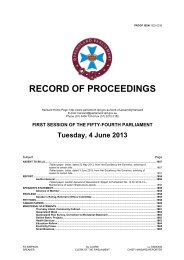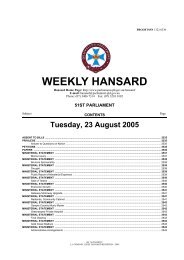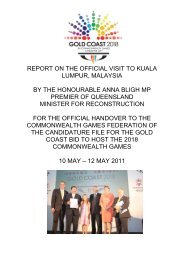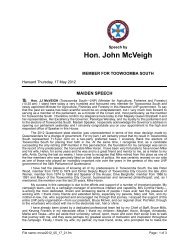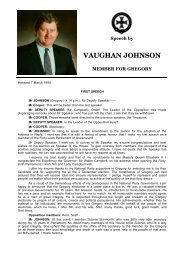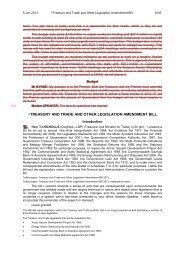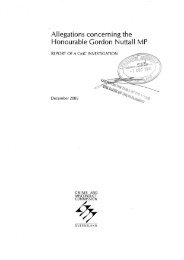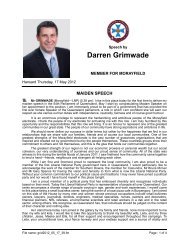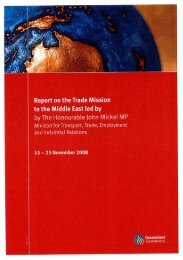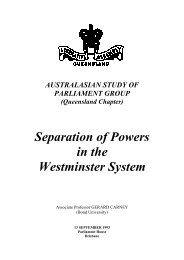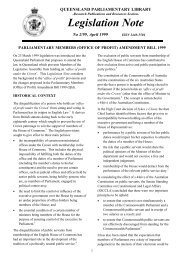Full transcript - Final - Queensland Parliament - Queensland ...
Full transcript - Final - Queensland Parliament - Queensland ...
Full transcript - Final - Queensland Parliament - Queensland ...
You also want an ePaper? Increase the reach of your titles
YUMPU automatically turns print PDFs into web optimized ePapers that Google loves.
9 Mar 1999 Trans-Tasman Mutual Recognition (<strong>Queensland</strong>) Bill 343<br />
Australian exporters by around 3%. Even<br />
conservative estimates suggest that, in the<br />
past decade, the average Australian family<br />
has gained around $1,000 a year from tariff<br />
reductions. Families have access to a wider<br />
range of affordable and high-quality products.<br />
For instance, imported motor vehicles would<br />
cost around 25% more if the 1988 tariffs still<br />
applied. That represents an extra $5,000 on a<br />
$20,000 motor car. And clothing and footwear<br />
would cost around 14% more, that is, an extra<br />
$300 for the average family to maintain its<br />
dress standards.<br />
In the confidence motion debate, the<br />
member for Crows Nest, in a state of perhaps<br />
high emotion, and certainly hyperbole, said—<br />
"Once upon a time we could actually<br />
build a car. Weren't we terrific! Now, we<br />
cannot build anything—everything has to<br />
be imported from everywhere."<br />
I have spoken to the member for Crows Nest<br />
about that, and what he was referring to, of<br />
course, was the perception that is held in the<br />
community. Perception it is, but it is certainly<br />
not factual. Let us look at the facts.<br />
Holden Australia is now the most<br />
productive General Motors plant for medium<br />
volumes and the centre for engineering<br />
excellence in the region. World exports could<br />
exceed $1 billion by the year 2000. Toyota in<br />
Australia is now more efficient, and exports are<br />
up from $47m in 1990 to $329m in 1996.<br />
Mitsubishi has expanded its export production<br />
in Australia. If we look at component<br />
manufacturers like PRR Automotive, Air<br />
International, Bosch and VDO—Australia<br />
requires local car manufacturing to make<br />
production in Australia viable, but all are very<br />
much export oriented due to the small and<br />
mature Australian market.<br />
In the textile industry, which people<br />
believe is nonexistent, Bradmill, which<br />
produces cotton and denim, Blundstone,<br />
which produces boots, and Gosh Leather have<br />
built export bases, whilst YAKKA and RM<br />
Williams have developed niche domestic<br />
markets. Firms like ATCO, Incat and Austral<br />
Ships, which construct ferries, ERG, Keycorp,<br />
which is influential in IT, and Air International,<br />
which is involved in vehicle airconditioning,<br />
have expanded and created jobs. In the<br />
primary industries sector, Australian food<br />
producers like Australia Meat Holdings, Kiwi<br />
Orchards, Ardmona, which specialises in<br />
canned deciduous fruit, the Sumich Group,<br />
which specialises in fresh and processed fruit<br />
and vegetables, and Tassal, which specialises<br />
in Atlantic salmon, are doing well.<br />
In <strong>Queensland</strong>, with groups such as<br />
Cotton <strong>Queensland</strong> and Cotton Australia, the<br />
cotton industry is one of the great success<br />
stories. It exports 95% of its product. This year,<br />
its production will exceed one million bales. I<br />
understand that it has even taken over one of<br />
the mills in the southern parts of America. The<br />
cotton gins in Goondiwindi provide significant<br />
regional employment. Now entrepreneurs are<br />
getting into textile manufacture. I praise<br />
particularly people like Sam Coulton and the<br />
people of Goondiwindi for their efforts in<br />
working with the TAFE colleges and getting<br />
this industry under way. I am very pleased to<br />
show the House today one of the fine-quality<br />
products made at Goondiwindi with<br />
Goondiwindi cotton.<br />
Mr Robertson: Table it.<br />
Mr MICKEL: I do not want to table it; I<br />
want to wear it. That company gave one to the<br />
Premier, and even managed to produce one<br />
in his size. <strong>Full</strong> credit goes to the <strong>Queensland</strong><br />
industry. These things are happening right<br />
here in <strong>Queensland</strong>. It is a fine, outstanding<br />
product, and one that is providing employment<br />
in regional <strong>Queensland</strong>. I would be delighted if<br />
we had a spinning mill here in <strong>Queensland</strong> as<br />
a direct result of the cotton industry.<br />
I also want to mention the Australian dairy<br />
industry. This year, it will provide over $2.2<br />
billion in exports, which is a phenomenal<br />
performance by any measure. Closer<br />
economic relations with New Zealand have<br />
provided additional competitive pressures on<br />
Australia's domestic and export market<br />
activities. The current Domestic Market<br />
Support Scheme, which will phase out by 30<br />
June 2000, places our industry at a<br />
disadvantage to New Zealand. The DMS does<br />
not require the New Zealand Dairy Board to<br />
pay the domestic product levy for New Zealand<br />
products sold on the Australian domestic<br />
market. The majority of Australian dairy<br />
companies believe that this places them at a<br />
competitive disadvantage to New Zealand<br />
dairy products marketed on the Australian<br />
domestic market. This arrangement, I must<br />
stress, is not a result of this legislation. I<br />
understand that some processors did not want<br />
the levy imposed on New Zealand. I raise it<br />
because we have to be very careful not to<br />
disadvantage ourselves in the name of<br />
competition. I must say in passing, too, that<br />
New Zealand prides itself on being totally<br />
deregulatory in dairying, yet it still retains a<br />
single-desk seller, the New Zealand Dairy<br />
Board, for its products, and it still has a big<br />
residual access into Europe under the last<br />
GATT round. There are many <strong>Queensland</strong>



